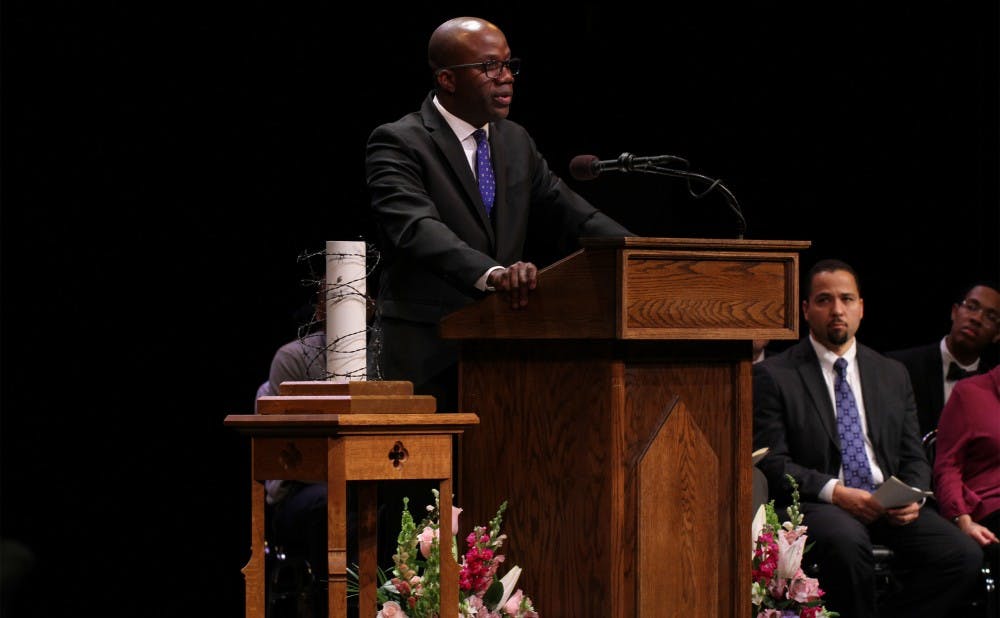Students, faculty and local community members gathered to listen to keynote speaker Shaun Harper during Duke's celebration of Martin Luther King, Jr.'s legacy Sunday afternoon.
Harper—associate professor of race and equity at the University of Pennsylvania and the founder of the Center for the Study of Race and Equity in Education—and other speakers including President Richard Brodhead, Durham Mayor Pro Tempore Cora Cole-McFadden and Black Student Alliance President Henry Washington, a junior, spoke about King's influence today and the changes that still need to be made so that America can be fair and just for all. Due to construction, Duke’s annual celebration of Martin Luther King Jr.'s legacy was held in Page Auditorium, rather than in the Chapel.
“I am here in Durham because injustice is here,” Harper said.
He addressed the main theme of this year’s commemoration—“Justice or Just Us: Who Is Working to Create a More Perfect Union?”—by describing the role that higher education has as a threat to justice.
“Universities, particularly elite ones like yours and mine, are viewed as places of enlightenment,” Harper said. “I argue that universities themselves pose a serious threat to justice.”
Drawing from his research on campus racial climates, Harper recounted two stories about white male college students.
His first story was about a student who had grown up in an entirely white community and chose to go to a school that advertised itself as diverse because the student “didn’t want to grow up to be a racist.” Despite the student’s desire to understand people from different backgrounds, he felt frustrated because there was no educational plan or anyone to teach him about different perspectives.
Harper’s second story told of a student who asked him a question referring to people of color as “colored.” After speaking more with the student, Harper learned that he was a senior.
“He was literally about to go into the world thinking it was entirely okay to call people of color ‘colored.'" he said. "Imagine what else he didn’t know about race, about language, about my people. Imagine what else college can fail to teach him and his peers about racial suffering, racial oppression, racial injustice, racial inequities.”
Emphasizing the power and prevalence of college graduates, Harper went on to explain what he saw as the full impact of ignorance.
“When we fail to teach about the realities of race, and the ever presence of racism in our country, or to help white students understand the experiential realities of people of color, or to teach students how to narrow racial equity gaps in industries or professions they will enter after graduation, we underprepare them for citizenship and leadership in a racially diverse democracy," he explained. "We set them up to fail the nation in its most vulnerable, persistently under-served population.”
Harper argued that universities must take partial responsibility for the racist attitudes and actions of their graduates, noting that Republican presidential candidate Donald Trump, who graduated from the University of Pennsylvania, has publicly called Mexican immigrants rapists and has called for Muslims to be banned from coming to the United States.
Harper ended his speech with a nod to Martin Luther King, Jr. and a demand to Duke and other universities.
“We need Duke...to better prepare [students]," he said. "We need many, many more of them to be critically conscious, well prepared college graduates, who understand that injustice anywhere is a threat to justice everywhere.”
He also reflected upon the student activism that has occurred across American universities during the past few months and reaffirmed the long-standing goals of students of color.
“The issues blacks and other students of color put on national display...were in response to longstanding racial problems," he said.
Other speakers at the event also echoed this year’s theme and Harper’s sentiments. Cole-McFadden, mayor pro tempore of Durham, noted the high number of homicides in 2015 and urged community members to mentor youths. Brodhead discussed the significance of the upcoming holiday.
“Martin Luther King Jr. Day is a powerful day because it reminds us that impossible things can be changed by certain means of human action," he said.
Washington spoke about the need for change starting at the individual level.
"We will not actualize a just reality without doing the work," he said.
Get The Chronicle straight to your inbox
Signup for our weekly newsletter. Cancel at any time.

